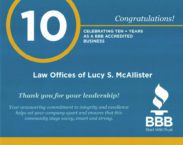It is imperative that California realtors establish and maintain proper professional boundaries with their clients to protect themselves both legally and professionally. There are many potential boundary issues to consider as a realtor including how they behave toward and communicate with their clients especially if they have prior personal, business or other ties. Each real estate agent must develop their own set of professional guidelines about these codes of conduct while being available to clients.
Consider the following fictionalized vignette:
Jane Realtor just received her real estate license in California. She has never represented a buyer or seller and is looking for her first client. Sarah Client has been Jane’s close friend for 10 years. Sarah lives in a very desirable area. Jane knows that Sarah has occasionally considered selling her home. Jane convinces Sarah that now is the time to sell. Sarah feels pressured and has concerns that Jane has not developed the skills, experience, or professional contacts to successfully sell her home at the highest price. Sarah is also uncomfortable with sharing her personal finances with a close friend. Sarah tells Jane that she plans on interviewing several realtors including Jane. Jane acts hurt and angry, fueling Sarah’s guilt. Not wanting to damage their friendship, Sarah asks Jane if Jane would consider co-listing Sarah’s house with another top realtor. Jane reluctantly agrees but is then incensed when Sarah asks if Jane would be willing to accept less commission than the more experienced co-listing real estate agent. Over the course of the listing, Sarah calls Jane at all times of the day and night with questions or concerns about the process. Jane wants to be available for her friend and client but also needs her sleep. Eventually, Jane and the other agent find a buyer who brings a low-ball offer. Jane fears losing the deal so tries to convince Sarah to accept the offer without countering. The co-listing agent suggests a counteroffer, to which Sarah agrees. A deal is reached, and the parties enter into escrow. What boundaries have been violated- and by whom?
The above example underlines the complexities of maintaining professional boundaries as a realtor.
What is a professional boundary?
Professional boundaries define appropriate behavior between professionals and the public. Boundaries serve to identify acceptable behaviors from those that aren’t. Imbalances often exist within a professional relationship, and boundaries serve to protect both the public and professional.
Selling or buying a home is a uniquely stressful endeavor. A realtor is often the gatekeeper to the process and holds a position of authority upon whose guidance a client depends. A real estate agent must establish and maintain proper boundaries with clients.
What is a boundary violation?
A boundary violation involves any behavior or interaction which causes harm to the professional or public. The realtor/client relationship involves mutual trust and respect. If this trust or respect is exploited, a potential boundary violation has occurred.
What are potential boundary violations between realtors and clients?
- Technology violations: Misrepresenting oneself professionally on social media, spamming clients.
- Emotional violations: Mismanaging feelings of anger or frustration toward a client, failing to recognize that a client is not a friend, acting as a friend or therapist to a client in order to close a deal.
- Relationship violations: Engaging in a romantic or sexual relationship with a current client, potentially representing a friend or relative.
- Power violations: Telling a client what to do, using a client’s personal connections for personal gain.
- Communication violations: Accepting client calls at any hour, failing to inform a client of one’s availability, not being honest with a client about their choice to walk away from a deal, bad-mouthing other realtors.
While some of the above examples are clear boundary violations, others are not so clear cut and may begin with a realtor’s best intentions. Consider a realtor who tells a client “Counter with this amount or you will lose the deal,” a realtor who agrees to represent her elderly grandparent in the sale of her home, or a realtor who answers the phone for clients at all hours. Realtors must learn to recognize potential boundary breaches and should regularly consult with their managing broker to minimize the risk of boundary violations.
How does a realtor maintain appropriate professional boundaries?
All behaviors and interactions between a realtor and client should prioritize the well-being of clients. Realtors have a position of authority, trust, and influence. A realtor must balance meeting the professional needs of the client while also setting appropriate boundaries for themselves. Realtors must be vigilant in considering the implications or consequences of their behavior.
Examples of realtors at risk for boundary violations:
- New realtors: Potential boundary violations may be more difficult to recognize for those newer to the profession. Newer realtors should consult with their managing broker to minimize the risk of boundary violations.
- Similarly-aged realtors/clients: Realtors of similar age to their clients often bond over common hobbies or activities but must maintain a clear understanding of professional boundaries.
- Dual relationships: Some realtors choose to work with family or friends. There are many factors to consider when combining work with personal relationships, and particular care must be exercised to avoid boundary breaches.
- Realtor’s social/emotional health: Realtors who are undergoing difficult personal circumstances such as grief, loss, divorce, financial struggles, or mental health issues can be at greater risk for blurred boundaries.
- Questions realtors should ask themselves:
- What is my policy regarding working with friends or relatives?
- What is my social media policy related to my clients?
- Do I have any inappropriate content on my personal social media accounts?
- Would I behave differently with my client if I was in the presence of my managing broker?
- Do I dress or act differently when I know that I will see a particular client?
- Has a colleague ever questioned my behavior toward a client?
- Would I have concern about another realtor behaving as I do?
- Do I ever put my own well-being above that of my clients?
- Am I currently having any personal difficulties that could affect my professional judgement?
- Do I regularly consult with my managing broker about potential boundary risks?
If you are a realtor facing disciplinary action, it is imperative to enlist the assistance of an experienced licensing attorney at the earliest stage of the disciplinary process. The Law Offices of Lucy S. McAllister are here to help. We understand the unique legal complexities facing real estate agents. We have the knowledge and experience to craft a comprehensive strategy and are dedicated to navigating your specific case through the disciplinary process to best defend your professional interests.
The Law Offices of Lucy S. McAllister have successfully represented a wide range of California licensed professionals including realtors, educators, nurses, physicians, and mental health practitioners. We are experienced in handling all types of licensing issues. Let us help you protect your professional license, your reputation, and your livelihood.
For additional information or to schedule a consultation on a professional licensing issue, please contact us today at (877) 280-9944.
For Additional Information
Set proper boundaries with real estate clients
Good Boundaries When Choosing a Friend or Relative as Your Realtor, by Alice Pierce












